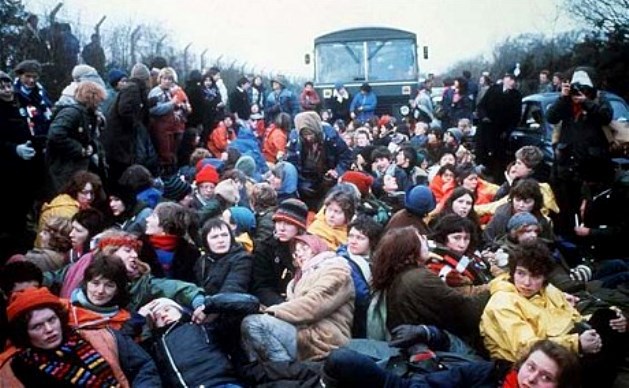THE
ARRIVAL OF CRUISE
There was no doubt at all that Mark Mob didn't mean
every word he sang and every sentiment he expressed in his songs, and
just like everyone else with an iota of awareness was totally
dismayed at the way the world was going. Mark's anxiety could only
have been ratcheted up another notch when Michael Heseltine announced
that any protester caught within the boundary of Greenham Common
missile base ran the risk of being shot.
As it was mostly American troops deployed there it
obviously meant that British citizens on British soil would be shot
dead by agents of a foreign power. And this was meant to be deemed as
being acceptable. For his troubles, a short time later when attending
Manchester University to address a meeting of Conservative students,
to shouts of “Better red than dead!”, Heseltine was sprayed with
red paint and pelted with eggs by anti-nuclear weapons protesters.
When Heseltine condemned the attack as being
'undemocratic', as to be expected by that time his condemnation was
supported by the CND leadership. Threatening to shoot dead peaceful
protesters was acceptable it seemed but not so taking direct action
against the perpetrator of that threat.
The atomic bomb might well have been less culturally
relevant than the poems of Charles Baudelaire but it was still
without question of huge social relevance even to Penny Rimbaud, so
when the first Cruise missiles started arriving at Greenham Common on
November 14 of 1983, the impact was emotional, to say the least.
Tears were shed and anger was vented in abundance.
Outside the House of Commons over 300 mainly women peace protesters
were arrested for trying to block the entrance with a lie-down
protest, whilst at Greenham another 150 women were arrested after
conducting a sit-down protest outside the main gates.
Had it always been a fanciful and naive notion to
believe that the deployment of Cruise could be halted? Cynics would
have said 'Yes' but then they would also have chosen to remain
cynically silent about the whole issue and of course, that silence
would always be taken as a sign of consent.
If the anti-nuclear protesters had been even greater in
number would they have succeeded in their aims? As there never seemed
to be any tipping point in sight it was unlikely. If the anti-nuclear
protesters had been more militant would they have been more
successful? Possibly.
If all the marchers traipsing off to Hyde Park or
Trafalgar Square had stopped off in Whitehall and started rioting or
had made their way to the City and brought it to a grinding halt, for
example, what might have happened? Whilst potentially giving
ammunition to the pro-nuclear brigade both in the government and in
the Right-wing press, it would certainly have made Thatcher's (and
also Kinnock's) position more difficult and it may also have led to a
Constitutional crisis.
Such thoughts, however, were purely hypothetical because
rather than rioting or stopping the City, protesters had chosen
instead to remain within the law, penned in on marches by police and
CND stewards. Contained.
The government had refused to listen and for all the
marching and non-violent direct action, Cruise missiles were now in
Britain with the only thing to raise the spirits being the promise
from anti-war groups that the deployment would open up a whole new
round of demonstrations and actions.

No comments:
Post a Comment